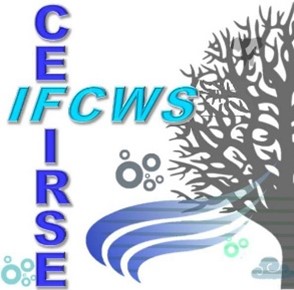The Indo French Cell for Water Sciences (IFCWS, in french CEFIRSE: Cellule Franco Indienne de Recherche en Sciences de l’Eau), was created in 2001 by the Indian Institute of Science (IISc, Bangalore) and the Institut de Recherche pour le Développement (IRD, France). It became a mixed international laboratory (LMI IRD) in 2010. Since 2014 it has been renewed for 4 years and it involves now the National Institute of Oceanography (NIO, Goa), the Indian Institute of Tropical Meteorology (IITM, Pune) and 6 French Research Units as principal partners. The long-term goal of IFCWS is to conduct integrated studies pertaining to water and soils in India, from local (soil-plant profile) to subcontinent scales. The collaboration harnesses the complementary skills between Indian and French researchers in disciplines such as hydrology, geochemistry, remote sensing, modeling, agronomy, oceanography, biochemistry, geophysics, geology, soil science, climate science.
This specificity, favoring day to day interactions between Indian and French scientists and students, was pivotal for the success of the collaboration. It was a focal point that allowed many Indian and French teams to build research projects (38 since 2014) and cooperate through exchanges/visits or training sessions. The whole collaborative activities involved about 30 full time scientists, more than 40 PhDs and post-docs and around 30 master students.
Common facilities include a water analysis platform, a modeling platform and since 2003, an environmental observatory, the Kabini Critical Zone Observatory (Indian sites of the SNO M-tropics, supported by INSU, IRD and UPS in France) which monitors the impacts of agriculture and climate on the water and biogeochemical cycles, with extensive use of remote sensing. Its main objective is to understand and model the processes involved in the response of the critical zone, especially water resources, to climate and land-use changes.
The IFCWS is working on two main themes :
1. Adaptation of pristine & agro-systems ecosystems to global changes
This thematic focuses on the relative influence of climate and anthropogenic forcing on water resource quantity and quality in the tropics. The multidisciplinary approach combines long term field monitoring, surveys, remote sensing and modeling. It is mainly based on the Critical Zone Observatory of the Kabini River Basin and involves hydrologists, geochemists, agronomists, ecologists, remote sensing scientists, social scientists and economists, working both on pristine ecosystems (forest) and agrosystems. The main objective is to establish water and biogeochemical mass balances, identify and quantify processes and their interactions in the critical zone (soil-plant-atmosphere system) and the dynamic response of these systems to climatic and anthropogenic forcings. We propose to expand significantly the partnership in the new phase, reinforce some scientific disciplines (e.g. social sciences, geophysics, geochemistry, agronomy, remote sensing…) and pursue the effort towards trans-disciplinarity and better integration of spatial scales, in consistency with the national research agenda of India.
2. Ocean-continent-atmosphere continuum : hydrological cycle & climate variability
The main objective is the understanding of climate variability, large-scale hydrology of the Indian subcontinent, physical and biogeochemical dynamics in the Indian Ocean, which are still rudimentary in many aspects. The topics to be studied include: (i) the large-scale continental hydrology of the Indian Subcontinent (ii) the Northern Indian Ocean water cycle and the impact of continental runoffs on hydrology and on salinity evolution of the Bay of Bengal (iii) the climate variability and monsoon (role of air-sea coupling in modulating climate variability including tropical cyclones and monsoon, regional impacts of climate change on monsoon rainfall), and (iv) the biogeochemistry of the Northern Indian Ocean.
In addition, the IFCWS also participates in projects linked with the following topic :
3. Environmental biotechnology with reference to mine and industrial waste processing and remediation
Technologies are developed for the abatement of toxic metals from aqueous systems. The research programme encompasses both basic and applied aspects of metal dissolution processes from mine and industrial environments, their transport across watercourses, bacteria-mineral interaction, bioremediation and understanding of underlying mechanisms. The formation of nano-particles through bio-precipitation routes is especially studied for elements such as arsenic, chromium, zinc, cadmium and copper.

Talks and Workshops
- Invited talk (Sekhar M., L. Ruiz) at the International Workshop on The Joy, Opportunities and Challenges in Field Hydrological Research, organized by Department of Civil Engineering at The National Institute of Engineering, Mysuru, India, 2nd – 6th November 2020 https://sites.google.com/nie.ac.in/fieldhydro/home
- Invited talks at the National Centre for Earth Science Studies (Ministry of Earth Sciences, Government of India), Thiruvananthapuram, Kerala, India. February 2020.
- Gomez C. Soil characterization by Vis-NIR-SWIR Spectroscopy. Examples with Sentinel-2 images for mapping Soil Texture & Sediment supply.
- Ruiz L. The Kabini Critical zone observatory
- Invited talk at the Department of Civil Engineering, Indian Institute of Technology Bombay, 06 October 2019, “High resolution remote sensing (<100m) for evapotranspiration retrieval at global scale” by G. Boulet.
- The IFCWS took part in the Side Event de l’IRD « Adaptation of agricultural systems to climate change: Scientific approaches for decision making at local scale » organized by IRD at the 14th Conference of Parties (COP14) of the United Nations Convention to Combat Desertification (UNCCD),at New Delhi, India on 7 Sept 2019, with talks of Sekhar M., L. Ruiz and C. Gomez.
